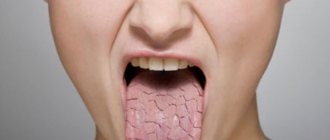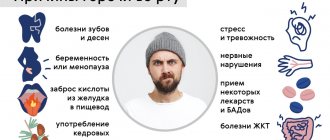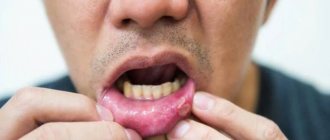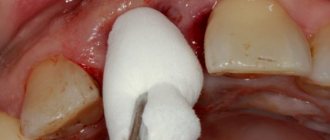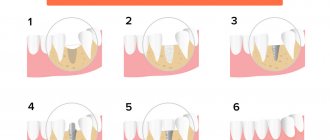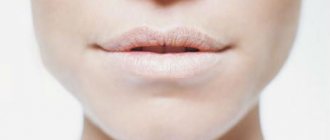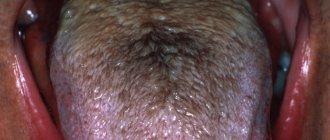Dry mouth is an unpleasant sensation that can be a symptom of serious illnesses. If dry mouth occurs constantly or frequently, it is necessary to understand the cause that is causing it and, if necessary, begin treatment. Elimination of dry mouth, as a rule, is achieved only as a result of treating the underlying disease, which should be the true goal. In any case, the feeling of dry mouth is another reason to pay attention to your health.
Dry mouth is caused by insufficient hydration of the oral mucosa, mostly due to insufficient saliva production. In medicine, dry mouth caused by a cessation or decrease in saliva production is called xerostomia.
.
Quite often, dry mouth occurs in the morning or at night (that is, after sleep).
Symptoms associated with dry mouth
Dry mouth in most cases manifests itself as a complex of symptoms described as:
- "viscosity" or "stickiness" in the mouth;
- thirst;
- irritation of the oral mucosa (burning and itching), the appearance of a bright border of the lips, cracks on the lips and in the corners of the mouth;
- dry tongue. The tongue turns red and becomes rough. It becomes more difficult to speak, chew and swallow. Decreased taste perception;
- dry throat. The voice becomes hoarse and more hoarse;
- there is an unpleasant odor from the mouth.
Poor oral hygiene
Poor hygiene is a common cause of xerostomia in healthy people. Dry, rough gums, sometimes itchy and red, are the result of excessively intense brushing, the use of too aggressive mouth rinses, or an allergy to toothpaste.
In this case, you should make care more gentle or replace hygiene products with better ones. Especially if you use alcohol-based rinses. Alcohol dries out mucous membranes.
A good option for careful hygiene would be products from the Asepta series. For example, a rinse based on xylitol, potassium citrate and herbal extracts - it soothes the gums, prevents inflammation and prevents tooth decay. For people with sensitive teeth, ASEPTA SENSITIVE toothpaste is suitable.
Causes of dry mouth that are not pathological
In some cases, dry mouth is not associated with a medical condition. For example:
- Dry mouth can occur in the morning and at night due to intoxication. This is a typical situation after drinking too much the night before.
- When nasal breathing is impaired, a person breathes through his mouth during sleep. The mouth is slightly open, and the oral mucosa dries out faster. Nasal breathing can be impaired due to a runny nose, nasal polyps, or a deviated nasal septum. A similar situation occurs with snoring. The cause of snoring in most cases is a decrease in the tone of the soft palate. Muscle weakening develops with age. This is why older people snore more often, and their oral mucosa becomes dry. This reason explains dry mouth in the morning in the elderly in most cases.
- If you don't drink enough fluids in hot weather, you shouldn't be surprised by dry mouth. A similar effect can be caused by eating highly salted foods.
- Many medications can cause dry mouth.
- Smoking is another common cause of dry mouth.
- Dry mouth can be one of the symptoms of menopause.
general characteristics
With insufficient salivation, constant dryness of the mucous membrane, burning and discomfort (burning mouth syndrome), and difficulty speaking are felt.
It becomes difficult for the patient to chew and swallow solid food. Some patients constantly drink water or use special formulations to maintain epithelial moisture. When examining the oral cavity, a small amount of viscous saliva, loss of shine and dryness of the mucous membrane are noted, and surface defects of the epithelium are detected. Saliva has trophic and protective properties for tooth enamel, so with xerostomia, teeth are affected by caries. The absence of lysozyme and nuclease causes a decrease in primary immune defense, which leads to candidiasis, manifested by a white coating on the epithelial membrane. Dryness and cracks in the lips are observed, and angular cheilitis often forms - long-term non-healing “jams” in the corners of the mouth. Elderly patients may complain of constant trauma to the mucous membrane when wearing prostheses.
Diseases that may cause dry mouth
Dry mouth can be caused by high fever and intoxication due to various infectious diseases (flu, sore throat, etc.). Diseases associated with large loss of fluid as a result of vomiting or diarrhea (cholera, dysentery) can also cause dry mouth. In such cases, dry mouth is one of many symptoms and does not attract special attention.
If dry mouth is combined with diarrhea, flatulence, belching, nausea and pain in the left side of the abdomen, then this may indicate pancreatitis.
Dry mouth in combination with a bitter taste, heartburn, white or yellow coating on the tongue can indicate diseases of the gastrointestinal tract such as gastritis, duodenitis, cholecystitis.
Dry mouth can also occur with:
- diseases of the salivary glands;
- endocrine diseases (diabetes mellitus, thyrotoxicosis);
- neoplasms of the oral cavity (benign and malignant);
- damage to nerve endings that contribute to the functioning of the salivary glands;
- anemia;
- vitamin A deficiency;
- systemic diseases (scleroderma, Sjogren's disease, cystic fibrosis).
Purpose of salivary fluid
The normal rate of saliva production for any adult is about 2 liters per day. Of course, all this happens gradually, all the saliva is gradually swallowed. Three pairs of large salivary glands are involved in the work, which are called sublingual, mandibular and parotid. Saliva enters the oral cavity through the passage of ducts. In addition, the mucosa also contains small salivary glands.
This liquid helps to moisturize the surface of the oral cavity, protects it from the occurrence of ulcers, wounds and cracks. It is important to note that salivary fluid also contains the substance lysozyme, which actively resists pathogenic microorganisms and prevents the occurrence of infection.
It is able to neutralize the effect of harmful lactic acid, which appears as a result of bacterial activity. At the same time, the risk of caries becomes much less. Saliva also contains calcium, which is necessary for the natural process of remineralization and strengthening of enamel. A lack of saliva can lead not only to the development of dental diseases, but also to loss of taste, strong odor and even pain.
Eliminate dry mouth
If dry mouth is caused by drinking alcohol and smoking, then it can only be eliminated by getting rid of the bad habit. It is recommended to reduce the consumption of salty and sweet foods. Pay attention to how you breathe - through your nose or mouth. If nasal breathing is difficult, the cause must be diagnosed and nasal breathing restored. To do this, you will have to see a doctor. It is also important to monitor the humidity in the room.
Dry mouth can be the first symptom of many diseases. Therefore, if you often experience a feeling of dry mouth, it is necessary to understand its nature, determine the cause and, if necessary, consult a doctor and begin treatment for the disease that caused this symptom.
How to prevent
The water-salt balance is restored by drinking plenty of fluids. When you are thirsty, you should drink up to 30-40 ml of liquid per kilogram of weight. Stimulation of saliva secretion is carried out by rinsing the mouth before bed with water and adding drops of lemon juice. Chewing gum and lozenges with citric acid increase salivation.
It is useful to take an infusion of coltsfoot or echinacea. It will prevent the development of colds, rhinitis, and strengthen the immune system during flu and colds. You can sleep peacefully at night, breathing freely through your nose. A sufficient amount of saliva will be released in the mouth during sleep to moisturize the mucous membrane if:
- stop smoking and drinking alcohol;
- eat properly without a lot of sweets and salty foods;
- brush your teeth with pastes containing fluoride, rinse your mouth with special solutions and balms in the morning;
- maintain optimal humidity in the room at 50-60%;
- control the temperature in the room by ventilating it before going to bed;
- engage in physical activity, observing the drinking regime.
Prevention of inflammation in the mouth, gums and teeth is successful with regular visits to the dentist.
Drying of the membranes of the oral cavity is felt especially after a night's rest. This sign cannot be ignored. Only an examination by a specialist and a thorough diagnosis will determine the cause of persistent dry mouth.
Which doctor should I contact for dry mouth?
If you complain of dry mouth, you can contact your dentist or general practitioner (GP or family doctor). After identifying the cause that caused the feeling of dryness, you may be redirected to an endocrinologist, gastroenterologist or rheumatologist.
Most likely, you will need to undergo various tests (general blood count, general urinalysis, blood test for thyroid hormones, biochemical blood test, serological test), and, if necessary, undergo some instrumental studies (ultrasound, radiography, computed tomography).
Treatment
The course of treatment is always individual, it depends on the causes of the disease and the characteristics of your body.
In cases where xerostomia is caused by a malfunction of the salivary glands, the doctor may prescribe a special massage that improves blood flow and restores fluid production. A more serious problem is blockage of the channels that remove saliva. In this case, you will need to clean them under local anesthesia. If the blockage is caused by a stone, surgical intervention is needed.
If the cause of xerostomia is an allergy or a side effect of drugs, what caused the reaction is excluded, and the drugs are replaced. The patient is advised to add vegetable oils to his food, drink vitamins and eat more fish.
If erosion or cracks have already appeared on the mucous membrane, they must be treated with special disinfectants. Rinsing with herbal decoctions also helps, but never with salt.
Sources:
- Clinical studies of antisensitive toothpaste “Asepta Sensitive” (A.A. Leontyev, O.V. Kalinina, S.B. Ulitovsky) A.A. LEONTIEV, dentist O.V. KALININA, dentist S.B. ULITOVSKY, Doctor of Medical Sciences, Prof. Department of Therapeutic Dentistry, St. Petersburg State Medical University named after. acad. I.P. Pavlova
- Prevention of recurrence of localized periodontitis in young A.K. YORDANISHVILI, Doctor of Medical Sciences, Professor, North-Western State Medical University named after. I.I. Mechnikov, Military Medical Academy named after. CM. Kirov, International Academy of Sciences of Ecology, Human Safety and Nature.
- Study of the clinical effectiveness of treatment and prophylactic agents of the Asepta line in the treatment of inflammatory periodontal diseases (A.I. Grudyanov, I.Yu. Aleksandrovskaya, V.Yu. Korzunina) A.I. GRUDYANOV, Doctor of Medical Sciences, Prof., Head of Department I.Yu. ALEXANDROVSKAYA, Ph.D. V.Yu. KORZUNINA, asp. Department of Periodontology, Central Research Institute of Dentistry and Maxillofacial Surgery, Rosmedtekhnologii, Moscow
- putrid odor from the mouth is a direct consequence of the intensive proliferation of bacteria;
- burning tongue - it appears with fungal diseases of the oral cavity;
- pimples and dry lips are formed due to a lack of vitamins in the body.
Other factors
Neuralgia
If the pelvic nerves are cold or inflamed for another reason, the pain may be felt in the hips and legs. With neuralgia of the pelvic nerves, a woman experiences discomfort from friction, especially when in an uncomfortable position.
Cystitis
Aching, sharp pain in the lower third of the abdomen - this is how inflammation in the bladder area manifests itself. During coitus, discomfort in the vagina and abdomen may intensify.
Venous blood stasis
Due to blood thickening due to an imbalance of vitamins, microelements, hormonal imbalances, and a sedentary lifestyle, a nagging pain in the lower abdomen may occur. Sex with venous stagnation of blood can be uncomfortable, and, even if there is no pain, it is much less likely to lead to orgasm - due to impaired blood circulation.
Psychological reasons
Lack of self-confidence, negative experiences in past relationships, fear of coitus, reluctance to have sexual intercourse with this partner - these and other factors affect the quality of sex and its possibility in general. The psychological state affects the amount of lubricant released and can lead to involuntary contraction of the vaginal muscles. Even in the absence of muscle spasms and with sufficient lubrication, sex can feel traumatic and uncomfortable.
Anatomically determined causes of discomfort during sex
Physiologically, partners may not be suitable for each other. Discomfort occurs when the sizes of the penis and vagina do not match: their length, diameter. If the difference is critical, during coitus the mucous membrane is injured and microtears appear. If the mucous membrane is injured regularly, chronic inflammation will occur. Injuries in the genital area increase the risk of infection entering the body and negatively affect the state of local immunity.
Reviews
Tatiana
I am happy to be among your guests at the clinic, I enjoy our communication, I am grateful for your super professionalism, for giving beauty and a sense of confidence in your professional actions, protection from “age-related changes”
